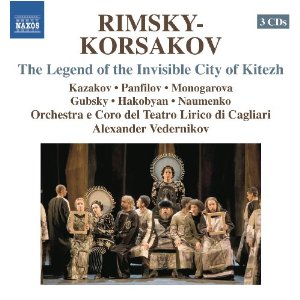
The Legend of the Invisible City of Kitezh and the Maiden Fevroniya was completed in 1905, near the end of Rimsky-Korsakov’s life. The score is an impressive culmination of a composer who found himself traveling in many social circles and was constantly gleaning lessons from divergent sources. Despite his presence in The Five and importance in preserving the works of Mussorgsky, he also had a professional relationship with Tchaikovsky and the western-influenced school that emphasized symphonic form and contrapuntal writing. Then there was an influential trip to Bayreuth to hear the Ring. Kitezh opera is often compared to Parsifal in theme, and much of the vivid orchestral writing has echoes of Wagner with plenty of Russian bling.
The story is enough of a cipher to make any regie-bent director salivate. To be brief: a pretty girl named Fevroniya lives in the forest (she’s something of a Disney character, talking with the animals and trees) where she meets a handsome guy one day. They fall in love, and it turns out he’s a prince. In the second act, the town of Little Kitzeh prepares for their wedding, and petty jealousies, class differences, and general drunkenness threaten to incite the crowd into rioting at the instigation of Grishka, the town drunk. But fortunately everybody feels more like partying instead. Unfortunately, the Tatars decide to raid the town, killing lots of people and capturing Fevroniya. Grishka promises to show the Tatars to Larger Kitzeh, and Fevroniya prays for the city to become invisible.
In answer to her prayers, a fog settles over the lake, and the Tatars and Grishka can’t find the city, although there is a battle anyway, and the Prince is killed. In the morning, the city is still invisible, but can be seen in the reflection of the water, which terrifies the Tatars, and they run away. Fevroniya has a hallucinatory dream, in which a bird tells her that she must welcome death. So she dies and is reunited with her ghost prince and everybody rejoices. For sheer mystical incoherence, it certainly matches anything Wagner came up with.
It’s a work rarely performed outside Russia, and the recording catalogue has relatively few options to choose from so this CD from Naxos, based on a live performance from the Teatro Lirico di Cagliari, is of particular interest. One has to wish that Naxos had included at least an online libretto to puzzle it all out, although a DVD
of the same production is also available in their catalogue.
In the role of Fevroniya, Tatiana Monogarova is one of the most perfectly cast on record. Her dusky voice quickly finds focus, and negotiates the long, twisting phrases with precision. This is a particularly unforgiving role, constantly asking the singer to take over melodies that every instrument in the orchestra has already been given a crack at, with shifts in register rivaling anything found in the bel canto repertoire. She rises to the challenge superbly, creating an incredibly moving performance.
The cast surrounding her is more variable. Like the operas of Mussorgsky, this is a large ensemble piece, relying heavily on small contributions in roles ranging from townspeople to magical birds. Fevroniya’s Prince Vsevolod, Vitaly Panfilov, has an unfortunately reedy tone, but thankfully the part is small. As the drunkard Grishka, Mikhail Gubsky often ventures too far into leathery sounding character acting, but his mad scene is particularly affecting. Valery Gilmanov and Alexander Naumenko are appropriately threatening as Tatars. The chorus has a particularly large role, and they acquit themselves admirably.
What really keeps this recording from being the ideal recording of Kitezh comes down to Vedernikov’s conducting. While the Cagliari Orchestra sounds particularly well prepared, giving one of the cleanest performances on record, the reading often lacks spontaneity and mystery. The battle music tends toward the academic rather than the lethal; the sound of the thick fog hovering around the city lacks density and obscurity. The tempi show little change from one to the next, nor do the accelerando gather much speed; there is a sense of stasis and tableaux, certainly a great deal of lyricism and detail but at the cost of the drama. Kitezh’s score blends the sounds of nature with religious fervor, but the missing ingredient here is that umami waft of mysticism.
Still, the Naxos comes at a bargain price, and is not only complete, but in very good sound. Both Svetlanov and Nebolsin lead searing performances, but the sound quality is rather Soviet. A more recent performance from the Bregenzer Festival under Fedoseyev cuts away about an hour of music – not for the purists perhaps, but a beautiful reading by the Vienna Symphony Orchestra.
The major competition then comes down to a live performance from the Kirov helmed by Gergiev, which features a rather uninvolved Gorchakova and doesn’t match the Naxos in sound quality (although a libretto is included). A few little bits and pieces are also worth exploring: Mravinsky’s vibrant recording of the suite, and Boris Christoff’s lovely reading of Prince Yuri’s aria. If the ideal recording hasn’t arrived yet, this release certainly provides an excellent introduction.
























Comments